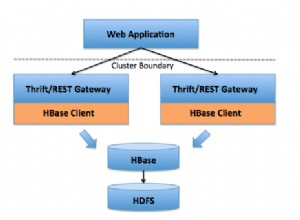Eh bien, comme le disent les docs tordus :
Les différés ne font pas que le codemagiquement ne bloque pas
Chaque fois que vous utilisez un code de blocage, tel que sleep , vous devez le reporter à un nouveau fil.
#!/usr/bin/env python
from twisted.internet import reactor,defer, threads
from twisted.internet.task import LoopingCall
import time
def main_loop():
print 'doing stuff in main loop.. do not block me!'
def aBlockingRedisCall(x):
if x<5: #all connections are busy, try later
print '%s is less than 5, get a redis client later' % x
x+=1
d = defer.Deferred()
d.addCallback(aBlockingRedisCall)
reactor.callLater(1.0,d.callback,x)
return d
else:
print 'got a redis client; doing lookup.. this may take a while'
def getstuff( x ):
time.sleep(3)
return "stuff is %s" % x
# getstuff is blocking, so you need to push it to a new thread
d = threads.deferToThread(getstuff, x)
d.addCallback(gotFinalResult)
return d
def gotFinalResult(x):
return 'final result is %s' % x
def result(res):
print res
def aBlockingMethod():
print 'going to sleep...'
time.sleep(10)
print 'woke up'
def main():
lc = LoopingCall(main_loop)
lc.start(2)
d = defer.Deferred()
d.addCallback(aBlockingRedisCall)
d.addCallback(result)
reactor.callInThread(d.callback, 1)
reactor.run()
if __name__=='__main__':
main()
Dans le cas où l'API Redis n'est pas très complexe, il peut être plus naturel de la réécrire en utilisant twisted.web, au lieu d'appeler simplement l'API de blocage dans de nombreux threads.




